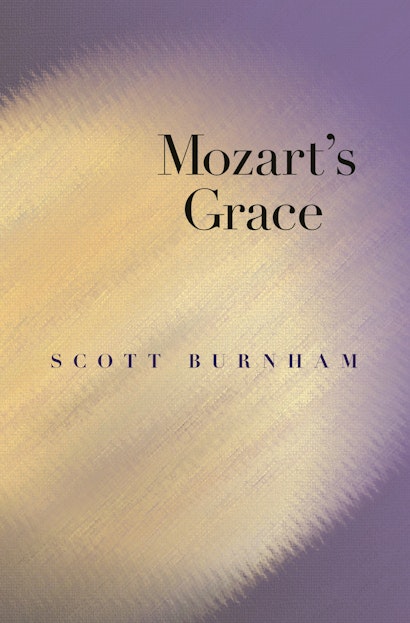It is a common article of faith that Mozart composed the most beautiful music we can know. But few of us ask why. Why does the beautiful in Mozart stand apart, as though untouched by human hands? At the same time, why does it inspire intimacy rather than distant admiration, love rather than awe? And how does Mozart’s music create and sustain its buoyant and ever-renewable effects? In Mozart’s Grace, Scott Burnham probes a treasury of passages from many different genres of Mozart’s music, listening always for the qualities of Mozartean beauty: beauty held in suspension; beauty placed in motion; beauty as the uncanny threshold of another dimension, whether inwardly profound or outwardly transcendent; and beauty as a time-stopping, weightless suffusion that comes on like an act of grace.
Throughout the book, Burnham engages musical issues such as sonority, texture, line, harmony, dissonance, and timing, and aspects of large-scale form such as thematic returns, retransitions, and endings. Vividly describing a range of musical effects, Burnham connects the ways and means of Mozart’s music to other domains of human significance, including expression, intimation, interiority, innocence, melancholy, irony, and renewal. We follow Mozart from grace to grace, and discover what his music can teach us about beauty and its relation to the human spirit. The result is a newly inflected view of our perennial attraction to Mozart’s music, presented in a way that will speak to musicians and music lovers alike.
Awards and Recognition
- Winner of the 2014 Otto Kinkeldey Award, American Musicological Society
- One of Choice's Outstanding Academic Titles for 2013
"Here is analysis and commentary written with considerable enthusiasm and affection. . . . Mozart's Grace is written with great fervour and yes, grace, together with a deep love of Mozart's music."—Classical Music Magazine
"The premise: identify some of the best bits in Mozart's works, then discover why they succeed so well. The idea is so starkly simple that one could expect a puerile result. However, Burnham, an eminent teacher, writer, and Mozartean, produces something rather wonderful. . . . [Mozart's Grace] is a book that does justice to its subject matter."—Choice
"This book has only deepened my admiration for its author."—Leo Black, Musical Times
"Mozart's Grace is written with great fervor and yes, grace, together with a deep love of Mozart's music. In these tough economic times one is heartened to see the publication of such a book."—John Robert Brown, Classical Music
"Burnham offers a stirring, erudite, and deeply poetic treatment of around fifty select passages as a culmination of some three decades of thought and discussion. . . . Through delightfully written prose bursting with musical metaphors that extend to all five senses, Scott Burnham argues persuasively for why we relentlessly submit ourselves to Mozart."—Steven D. Mathews, Notes
"[Burnham's] writing, sentence by sentence, is clear as air yet shimmers with revelatory understanding of the effects that Mozart's music makes on the listener, illustrating and supporting his discoveries with penetrating and meticulous explication of details in the musical examples. In doing so he offers some of the most sensitive, nuanced, perceptive, and eloquent commentary about music (of any kind) I've read."—American Record Guide
"Rarely does love pour from musicological writing as generously as it does from Scott Burnham's ingenious, congenial paean. At 169 pages of text including generous musical examples throughout, Mozart's Grace teaches us a great deal about Mozart, concision, and well-turned prose."—David Schneider, Music and Letters
"How does Scott Burnham do it? He manages the Mozartean feat of effortlessness, clarity, and beauty in luminous prose that makes musical processes give up their secrets and yet retain the sense of their mysterious power. The satisfying shape of this book moves with revelatory imagery from Mozart's limpid opening phrases through disruptive thresholds toward thematic returns both weightless and profound. A full landscape of emotional states is thrillingly revealed. Burnham paints Mozart's achievements in strikingly vivid and personal ways even as he places them within the broad conceptual fields of musical beauty and ideas of the self between the Enlightenment and romanticism. A stirring book."—Elaine Sisman, Columbia University
"No one hears with more joy than Scott Burnham, and we are all the richer for it. Any performer will find here inspiration for focusing awareness on the particulars of Mozart's language. The elements of his music are poetically teased apart in order that we may be granted space to listen and feel more deeply. Burnham offers us a primer on how to open oneself to music, develop the sensitivity to be vulnerable to its specific intimacies and charms, and, in so doing, experience the profound pleasure of connection with Mozart's works."—Mark Steinberg, Brentano String Quartet
"Concentrating on music's effects, this distinctive and original book focuses on the most important elements of Mozart's music. Moving beyond conventional analysis and using the figurative powers of language with skill and imagination, Burnham's personal and carefully conceived book will be read and valued by lovers of Mozart's art."—Karol Berger, author of Bach's Cycle, Mozart's Arrow: An Essay on the Origins of Musical Modernity
"This virtuosic and deeply touching book distills a lifetime of listening to Mozart into a powerful work of appreciation. Writing from an unapologetically personal point of view, Burnham examines certain passages in detail to describe how a particularly Mozartean beauty comes about. This book is a real gift."—Mary Hunter, Bowdoin College

